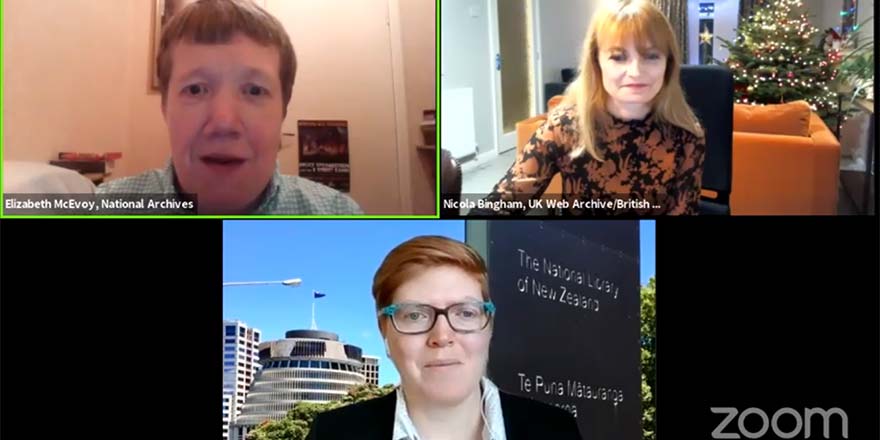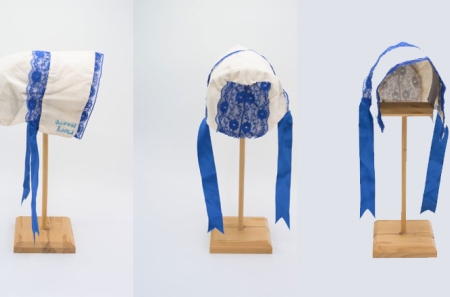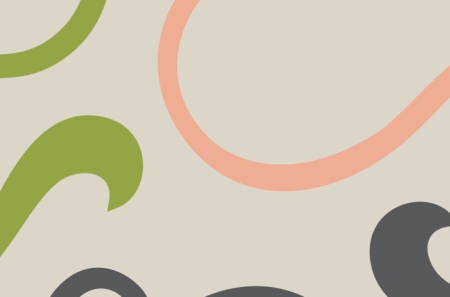
Recording Available for ‘Collecting in a Crisis: Rapid Response Web and Social Media Archiving’
04 December 2020Learn how our digital cultural memory is safeguarded through the rapid response actions of digital archivists.
On 2 December 2020, the Digital Repository of Ireland (DRI), in collaboration with the National Archives Ireland (NAI), hosted the final webinar of 2020 in our public lecture series on digital preservation.
‘Collecting in a Crisis: Rapid Response Web and Social Media Archiving’ aimed to open up an international conversation on rapid response archiving strategies during the COVID-19 pandemic, highlight the invaluable work of digital archivists in documenting this historical moment, and provide a forum for collaborative learning and knowledge sharing.
We were delighted to be joined by our first speaker Nicola Bingham, lead curator for web archives at the British Library. In her talk, Nicola describes the Digital Preservation Award-winning work of the UK Web Archive, a partnership of six UK Legal Deposit Libraries that has been collecting websites reflecting the UK perspective of the COVID-19 Pandemic. Nicola outlines the web content that the UK Web Archive has been collecting, describes the strategies of staff responsible for the collecting, and shares information about the tools and technologies used to collect the content. The UK Web Archive is experienced in rapid response collecting and has curated thematic collections on events that unfolded rapidly like the London Bombings 2005, Swine Flu 2009, Ebola Outbreak 2014, Zika Virus 2015-16, Grenfell Tower Fire 2017, and Anti-racism Protests UK 2020. The Coronavirus (COVID-19) UK collection forms part of their Pandemic Outbreaks Collection. Archiving web content that is constantly mutating and changing presents a challenge; Nicola notes that ‘as web content is ephemeral and dynamic it is important to react in real-time otherwise we’ll miss this content’ as ‘it is very difficult to retrospectively acquire it’.
In her talk, Nicola also highlights the democratising potential of web archiving. The UK Web Archive strives to embed co-curation into their collection strategy by working with other COVID-19 collecting projects, like ‘The Boredom Project’ led by a group of 15-24-year-olds, to ensure that their collections are inclusive and diverse. Find out more about the UK Web Archive’s collecting strategies and use of archival tools and technologies by listening to the recording.
Our second speaker Valerie Love, senior digital archivist at Alexander Turnbull Library, gave a fascinating overview of the collaborative work that the Library’s Digital Collecting and Legal Deposit teams have been doing to collect and preserve public responses to the crisis on social media platforms. Social media has been harnessed to connect people during the crisis, to share images and stories, and to comment creatively on the cultural moment. Valerie notes that as New Zealand went into lockdown there was an ‘explosion of social media with artwork, and memes, and videos, and parody, in addition to very important official information being broadcast across both existing and new social media channels’. The Library’s Digital Collecting and Legal Deposit teams responded to the cultural moment by coming together over Zoom to decide what they could and should collect and to establish an approach to managing collecting activity.
Valerie outlines the practical steps that went into investigating what tools and methods to use to collect and appraise social media content. As well as collecting Twitter, Facebook, and Instagram content, the Library collected new and emerging forms of culturally valuable online content. For example, memes were identified as an important collecting strain as they provide ‘comic relief and distraction during this time of global uncertainty, as well as conveying information’. Another distinctive collection item came in the form of the IMDB page for the New Zealand Minister of Health’s Daily COVID-19 briefings, which features satirical reviews of unfolding events that, as Valerie observes, demonstrate the Kiwi sense of humour in some amazing ways. The content that the Library has collected provides unique insight into the public’s response to the crisis that will be of critical benefit to future generations researching the social and cultural impact of the COVID-19 pandemic. We encourage you to listen to the talk in full to learn more about the challenges and opportunities afforded by social media archiving.
We hope this webinar recording will serve as a useful resource to anybody interested in web or social media archiving or hoping to learn more about how our digital cultural memory is safeguarded in a time of crisis.
We are grateful to our speakers for sharing their expertise and experiences and to the international audience of attendees for their thoughtful and engaging questions.
If you would like to listen to previous lectures in this collaborative series, we encourage you to enjoy the recordings linked below:
- 22 October 2020, ‘Archival Activism: Community-Centred Approaches to Archives’
- 16 June 2020, ‘The Power of a Photograph: Collecting and Digital Preservation in Times of Social Change’
- 26 September 2019, ‘Personal Digital Archiving: Storing, Organising and Protecting your Digital Content for the Future’
We look forward to sharing more content with you in 2021!
Further Resources
- Bingham, Nicola. 2020. ‘Harnessing the Crowd: Coronavirus Topical Collection at the UK Web Archive’. Digital Preservation Coalition . 30 March. https://www.dpconline.org/blog/series-wa-coronavirus-bingham-1.
- International Internet Preservation Consortium (IIPCO). ‘IIPC Collaborative Collections: Novel Coronavirus Outbreak’. https://netpreserve.org/events/iipc-cdg-collection-novel-coronavirus-outbreak/.
- Love, Valerie. 2020. ‘Saving your Social Media’. National Library of New Zealand Blog. 24 June. https://natlib.govt.nz/blog/posts/saving-your-social-media.
- National Library of New Zealand. ‘New Zealand Web Archive’. National Library of New Zealand. https://natlib.govt.nz/collections/a-z/new-zealand-web-archive.
- UK Web Archive (UKWA). ‘Pandemic Outbreaks’. UK Web Archive. https://www.webarchive.org.uk/en/ukwa/collection/2446.



